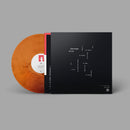





Description
The extraordinary debut album from percussionist, drummer and producer Sarathy Korwar – “Day To Day” – fuses traditional folk music of the Sidi community in India (combining East African, Sufi and Indian influences) with jazz and electronics. It’s a collaborative release by Ninja Tune with The Steve Reid Foundation – a charitable trust established by Brownswood / Gilles Peterson with the dual objective of helping musicians in crisis and also supporting emerging talent. Sarathy is an alumnus of the Foundation’s development program, mentored by Four Tet, Emanative, Floating Points, Koreless and Gilles Peterson – all trustees of the foundation.
“Sarathy instantly caught my attention when he said he wanted to make an album that embraced both Indian folk music and jazz - two worlds that have had a big influence on me. His album succeeds in bringing these things together in an elegant way, but it’s his own style and ideas that come through the most in the music. Refreshingly different, this is a deep and powerful listening experience.” Four Tet
The Steve Reid Foundation commemorates the life and legacy of legendary percussionist/drummer Steve Reid. It is fitting that Sarathy’s album follows the lineage and spirit of Reid who himself left New York and took on a spiritual pilgrimage through Africa in the mid-1960s. For three years he journeyed through West Africa, playing with people along the way, including Fela Kuti, Guy Warren and Randy Weston. The musical roots and routes of the Black Atlantic have been discussed and documented extensively, but Sarathy is highlighting a different dispersal of people in the other direction, from East Africa to India. The Sidis travelled to India from Africa as merchants, sailors, indentured servants and mercenaries from as far back as 628 AD and have settled in India ever since.
Conceived on an extended trip to rural Gujarat, followed by sessions at Dawn Studios in Pune, Sarathy made field recordings of The Sidi Troupe of Ratanpur whose vocals and percussion form the backbone of “Day To Day”. The troupe features five drummers – their polyrhythms reflect their African heritage, in contrast to traditional Indian drummers who play in unison. Likewise, the Malunga bows (there are only 4 or 5 players in India) bear a striking resemblance to those found in Africa.
“The record is about how we individually and collectively live from day to day. The everyday rituals and tasks that bind us together, it’s a celebration of the trivial and mundane,” explains Sarathy. The colourful handmade rag quilts that the Sidis make using everyday fabrics serve as a perfect metaphor for the record: “The Sidi women make these amazing collages of colour using everyday rags,” he says. “That’s how I see this album”.
Born in the US, Sarathy Korwar grew up in Ahmedabad and Chennai in India. He began playing tabla aged 10 but was also drawn to the American music that he heard on the radio and that leaked through the doorway of his local jazz music shop, Ahmad Jamal and John Coltrane were early discoveries. At 17, Sarathy moved to Pune to study for a degree in Environmental Science, but instead dedicated his time to music: practicing tabla under the tutelage of Rajeev Devasthali, translating his skills to the Western drumkit and playing as a session musician. Finishing his studies, Sarathy began to think about pursuing a career in music and moved to London, where he trained as a classical tabla player under the guidance of Sanju Sahai and graduated with a MMus in Performance from SOAS (School of Oriental and African Studies) focusing on the adaptation of Indian classical rhythmic material to non-Indian percussion instruments.
Working the angles in London’s jazz scene, Sarathy connected with Shabaka Hutchings (Sons of Kemet, The Comet is Coming), Cara Stacey (Kit Records) and played with clarinettist Arun Ghosh. He was, however, itching to create under his own name and he started researching and formulating the concept for “Day To Day” and planning a trip to India to record the Sidis. It was late in 2014 when Sarathy heard about the Steve Reid Foundation. He applied with a three-minute video explaining his vision for the record and was accepted onto the project to be mentored by the foundation’s patrons: Four Tet, Floating Points, Gilles Peterson, Koreless and Emanative (aka Nick Woodmansey who mixed the album).
Listen
Refund Policy
RETURNS
----
Our policy lasts 7 days. If 7 days have gone by since arrival date, unfortunately we can’t offer you a refund.
To be eligible for a return, your item must be unused and in the same condition that you received it. It must also be in the original packaging.
To complete your return, we require a receipt or proof of purchase.Please do not send your purchase back to the manufacturer.
There are certain situations where only partial refunds are granted: (if applicable)
* Book with obvious signs of use
* CD, DVD, cassette tape, or vinyl record that has been opened.
* Any item not in its original condition, is damaged or missing parts for reasons not due to our error.
* Any item that is returned more than 7 days after delivery Refunds (if applicable)
Once your return is received and inspected, we will send you an email to notify you that we have received your returned item. We will also notify you of the approval or rejection of your refund.
If you are approved, then your refund will be processed, and a credit will automatically be applied to your credit card or original method of payment, within a certain amount of days.
Late or missing refunds (if applicable)
If you haven’t received a refund yet, first check your bank account again.
Then contact your credit card company, it may take some time before your refund is officially posted.
Next contact your bank. There is often some processing time before a refund is posted.
If you’ve done all of this and you still have not received your refund yet, please contact us at om@meditations.jp.Sale items (if applicable)
Only regular priced items may be refunded, unfortunately sale items cannot be refunded.
Exchanges
We do not exchange items.
If the item wasn’t marked as a gift when purchased, or the gift giver had the order shipped to themselves to give to you later, we will send a refund to the gift giver and he will find out about your return.Shipping
To return your product, you should mail your product to: 3F Kasuga Bldg., 253 Demizu-cho, Kamigyo-ku, Kyoto, 26, 6020862, Japan.
You will be responsible for paying for your own shipping costs for returning your item. Shipping costs are non-refundable. If you receive a refund, the cost of return shipping will be deducted from your refund.
Depending on where you live, the time it may take for your exchanged product to reach you, may vary.
If you are shipping an item over $75, you should consider using a trackable shipping service or purchasing shipping insurance. We don’t guarantee that we will receive your returned item.
